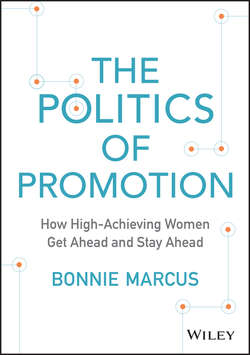Читать книгу The Politics of Promotion - Marcus Bonnie - Страница 6
На сайте Литреса книга снята с продажи.
1
Politics in the Workplace
How It Works and How Women Fit into It
ОглавлениеSallie Krawcheck, once named the most powerful woman on Wall Street, said it felt like she was fired when a restructuring at Bank of America eliminated her role in 2011. She was asked to join the bank to turn around its Merrill Lynch and U.S. Trust wealth management businesses. What seemed like a perfect role for her turned out to be a blindside. Bank of America was a mixture of several cultures due to acquisitions and leadership changes. Though Sallie attempted to navigate and understand the ever-changing political landscape, she was considered an outsider with few ties to any of the powerful cliques within the bank.
Sallie, based in New York, found it challenging to build relationships and camaraderie with her team and the key stakeholders who were in the corporate headquarters in Charlotte, North Carolina: “It's hard to be part of the inside jokes when you're not there or you aren't having a few minutes swapping stories while grabbing a coffee between meetings. I was never part of the meetings-before-the-meetings, or the meetings-after-the-meeting, or the ‘real’ meeting; I was just part of the official meeting (which in some companies can be the least important meeting of them all).”1
Sallie wasn't in the “in crowd.” Not only was she not located at the corporate headquarters, but she was still viewed as an outsider to Bank of America culture. She was not invited to these informal meetings where the real politics play out, where important decisions are made. Despite her attempts to gain access, she was unable to maneuver through the complex politics. Because Sallie was astute, she understood her vulnerability as an outsider. But, like many of us, Sallie also believed that her business results would help to maintain her status and substantiate her value to the bank. “I realized I wasn't part of the ‘inner circle.’ But I mistakenly believed that if my team delivered strong business results – and, as I repeatedly told the team, if we were the business no one had to worry about – we would be successful. But on the day I left, the business was ahead of budget and gaining share.”2
Sallie is a great example of a woman who is a top performer and incredibly savvy about workplace politics. Her résumé validates this. She had repeatedly overcome political and cultural barriers in her past to achieve top leadership roles. Yet despite her best efforts to understand and master the politics at Bank of America, she was blindsided. Her job was eliminated. And though she was offered another position at a lower level, Sallie decided to leave the bank. She was trumped by the politics.
1
Sallie Krawcheck, “What I Learned When I Got Ousted from Bank of America,” Quartz, October 23, 2013, http://qz.com/138512/sallie-krawcheck-what-i-learned-when-i-got-ousted-from-bank-of-america/.
2
Ibid.
